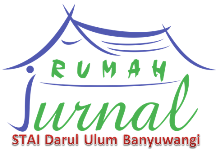ECONOMIC
Publication Ethics
Publication Ethics And Malpractice Statement
Economic: Journals of Islamic Economic and Islamic Law is a journal published twice a year in both of print and online by High School Islamic Darul Ulum Banyuwangi. This statement explains about the ethical behavior of all involved parties in publication of Economic: Journals of Islamic Economic and Islamic Law, including the authors, editors, Bestari partners and publishers.
Rule of Plagiarism
To validate the submitted articles, editorial team will check the text on Google Scholar and also use the plagiarism checker software.
The Ethical Guidelines of Publishing
Publishing articles in Economic: Journals of Islamic Economic and Islamic Law is an essential building in the development of knowledge which is coherent and respectable. This can be a reflection of the quality of work from authors or institutions that support them. The reviewed article supports and contains the scientific method. So, it is important to agree the standards of ethical behavior that is expected for all of the parties who involved in publishing, such as authors, editor journals, Bestari partners, publishers, and public.
High School Islamic Darul Ulum Banyuwangi as the publisher of Economic: Journals of Islamic Economic and Islamic Law is responsible to escort the whole process in publishing and recognizes the ethical responsibilities and other related responsibilities. The institutions is not only committed to ensure that the advertisement will be continuously printed and other commercial income has no impact or influence on editorial decisions, but also committed to assist the communication among journal managers and/or other publishers if it seems to be useful and necessarily to do.
Decisions of Publishing
The editorial of Economic: Journals of Islamic Economic and Islamic Law is responsible to decide which one of the submitted articles will be published. The validation of the text and worthiness of the article for researchers and readers should always consider before making decisions. The editor can be guided by journal editor policies and is limited by law as the commitment to fight against defamation, copyright infringement and plagiarism. Editors can confer with other editors or the assessment team for making the decision.
Contribution to Editorial Decisions
The assessment of bestari partners will help the editor in making editorial decisions and through the intense communications, the editorial team may also help the editors to improve their writing.
Recognition of Sources
The assessors should confirm that the published articles which is relevant is not quoted by the author. Every statement of an observation, derivation, or argument that had been previously reported should be attached by relevant quotes. An assessor must ask the editor to consider any similarity or overlap among the texts and other published writings.
Fair recognition of the other’s work must always be given. The authors should cite the essential publication to determine the nature of the reported text.
Standard of Reporting
The authors should present an accurate report of their work and an objective discussion about its significance. Basic data must be represented accurately in the text. An article should include enough details and references so that everyone can reiterate the work. Fraudulent statements or intentionally inaccurate statements are such an unethical behavior and are totally unacceptable
Originality and Plagiarism
The authors should ensure themselves that they wrote the text purely original, and that they have quoted correctly when referencing the other’s works.
Double Publishing, Repetition or Concurrent
In general, a writer is not allowed to publish the text which essentially describes the same research in more than one journal or other main publications. Submitting the same text to more than one journal concurrently is such an unethical behavior and is totally unacceptable.






